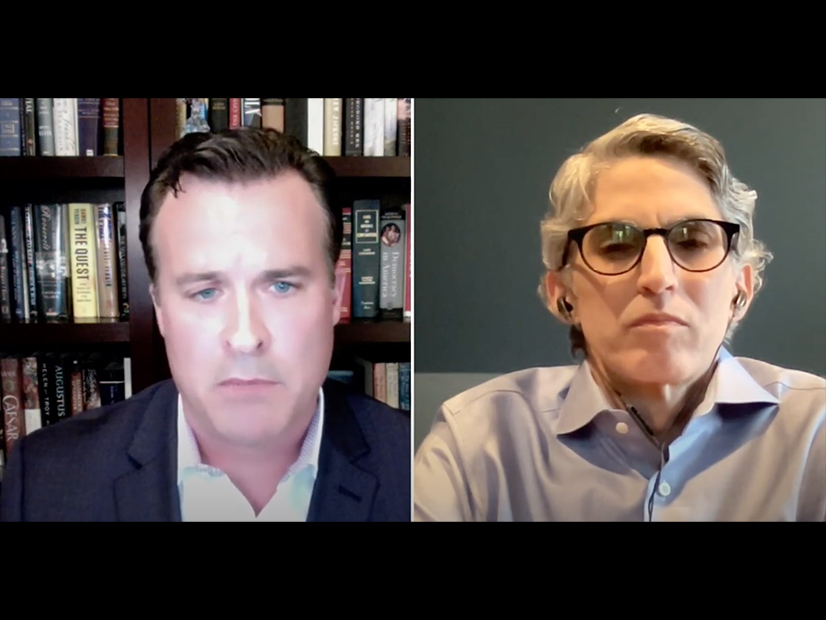The U.S. Securities and Exchange Commission’s proposed rule issued March 21 to require standardized disclosure by public corporations of the impact of their practices on the environment follows a dramatic increase in the demand for such disclosure from investors, a former commissioner said.
“It is important to recognize and to acknowledge the amount of progress that businesses have already made on this front, that this rulemaking takes place against what is a dramatic increase in climate-related disclosures that companies, facing interest and pressure from various stakeholders, have chosen to disclose,” former SEC Commissioner Troy Paredes said in a discussion Thursday at the Bipartisan Policy Center.
“And that actually is exactly what ‘market discipline’ and private ordering would predict,” he added in a discussion with BPC senior adviser Tim Doyle about the role of the SEC and its relationship with corporations as well as investors. “I think that’s an important backdrop, worth taking some note of.
“It’s important to recognize that there are shifts in terms of market expectations of one type or another. There are different stakeholders demanding different information for one reason or another.”
But this climate-related rule comes at a time when President Biden has made addressing climate change a whole-of-government issue with his January 2021 executive order, Doyle noted.
And “in May of 2021, he issued an executive order dealing with climate-related financial risk. I think you could make a pretty good argument that this rule has at least some connection with [the executive order], especially given the language that is in that executive order about a consistent, clear, comparable and accurate disclosure of climate financial risks,” he said.
Paredes, an appointee of President George W. Bush who served on the SEC from 2008 to 2013, said the climate issue is not new and that the market is already further along in the process than otherwise might be expected.
“From a company’s perspective, it strikes me that this rulemaking is extraordinarily consequential,” he added.
The question of “materiality” — that is, what to report — is at the heart of controversy about the SEC proposal, Paredes and Doyle agreed.
They also agreed that deciding what’s material has been an issue without a concrete definition since Congress created the SEC in 1934 in response to the stock market crash of 1929. The issue evolved gradually over time, except when Congress passed new legislation from time to time setting out specific requirements.
“The way it gets articulated … is investor protection; fair, orderly and efficient markets; and facilitating capital formation. They are often times identified as three separate parts to the SEC mission,” Paredes said. “The fact of the matter is that they intersect, and they support one another, but there may be instances where they can come into some tension,” he added in reference to the growing controversy over the rule, approved by a 3-1 vote. The rule will become effective in December unless challenged in court and could cost corporations billions of dollars to comply.
“I think there’s widespread agreement that the SEC’s core operating tool is disclosure,” Paredes said, “to get investor information in the hands of investors so that investors can make better informed decisions about how to allocate their capital. And the focus there in particular has been historically on material information.”
The proposal could require a company to disclose not only the impact of its operations on the environment but also the environmental impact of its products, if any, and the impact of its suppliers — requirements sure to be debated in the coming months.
To that coming battle, Paredes pointed out that historically, the SEC’s rules have leaned toward allowing the market, rather than the government, to decide.
“Go back to the founding of the SEC, [and there has been] a recognition that it’s better to allow the marketplace to decide how capital is going to be allocated as compared to the government making the decisions around capital allocation. And again, the means to facilitate that is to give information to investors so they can make those decisions in an informed way but still in lieu of the government making those decisions.”
Doyle agreed, adding that the tension between a hard and fast rule and giving companies the ability within a framework to disclose information has been at the heart of many of the commission’s corporate requirements.
Paredes added that even when Congress ordered the SEC to issue new rules in a particular area, over subsequent years “everything has always been a bit of a blend” of rules and reasonable practice. He said requirements that started out as guidance sometimes become a bit more rule-like over decades of interpretation.
“The demarcation sometimes can be a bit a bit blurry. But I do think it comes down as a practical matter in some respects, to how much discretion does the board [or] management team have in fashioning disclosures versus how much of that is going to be dictated more prescriptively by the regulator,” he said.



